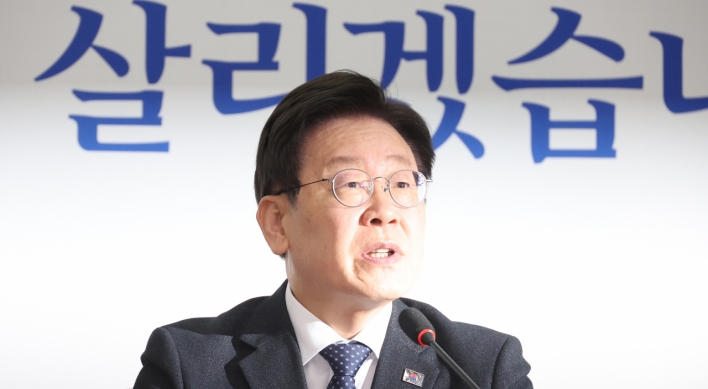Shortly after President Park Geun-hye took office in early 2013, her administration announced a plan to collect an additional 27.2 trillion won ($23.3 billion) in tax revenue over the next five years by shedding light on underground business activities. The envisioned tax revenue was part of a scheme for financing Park’s welfare programs without raising tax rates as she promised during her election campaign.
In a parliamentary audit of the National Tax Service in September, taxation officials said they had collected 2.1 trillion won and 3.07 trillion won in additional revenues in 2013 and 2014, respectively, by uncovering the underground economy.
But a recent study showed that the Park administration has made no significant dent in the country’s shadow economy.
The size of the underground economy in Korea was estimated at 446.5 trillion won last year, a 569-fold increase from about 785 billion won in 1972, according to the study jointly conducted by the Korea Development Institute, a state-run think tank, and a national council tasked with supporting government-funded research organizations.
Indeed, the figure marked a slight decline from the peak of 470.8 trillion won in 2012. But the ratio of the country’s shadow economy to gross domestic product still remained above 30 percent in 2014, little changed from the corresponding figures for previous years.

“It seems that the country’s underground economy is growing recently as demand for cash is rising due to long-standing low interest rates and increasing economic uncertainties,” said Kang Moon-soo, professor at the KDI School of Public Policy and Management.
The study showed the size of Korea’s shadow economy was much larger than calculated by a previous study, which estimated it at about 23 percent of GDP in 2013.
The country’s underground economy would have expanded at a steeper pace without measures taken in the late 1990s and early 2000s to regulate it and encourage transparent transactions. Among them were the introduction of the real-name financial transaction system, tax credits on card spending and the issuance of receipts for cash payments.
Without these measures, the size of Korea’s underground economy might have reached 577.6 trillion won, or 38.9 percent of GDP, by 2014, according to the study.
Experts note the country is likely to see its shadow economy continuing to expand in the years ahead as concerns remain unabated about risks from a continuous, though gradual, rise in U.S. interest rates and a deepening slowdown in China.
“A tendency seen in the past is that Korea’s underground economy has grown at times when the country goes through economic difficulties like the 1997-98 foreign exchange crisis and the global financial crisis in the late 2000s,” said Kwon Sun-ju, an economics professor at Changwon University and coauthor of the study.
Experts say efforts should be stepped up to reduce the shadow economy, noting a decrease in underground business activities is needed to make a nation’s economy healthier and more competitive.
“It is never an easy job to scale down the underground economy,” said Kang, the KDI professor. “The work will need the government to exert persistent efforts to enhance the level of the country’s socioeconomic institutes and systems to match the standards of advanced nations.”
Officials at the Ministry of Strategy and Finance say they will continue to strengthen measures to uncover the shadow economy.
Experts note it may be more effective to offer various incentives than resorting to stiff regulations such as frequent tax audits partly motivated to meet the preset target for tax revenues. They say it needs to be reminded that the crackdown on underground business activities in the early days of the Park administration resulted in more banknotes, particularly 50,000 won bills, being kept under the mattress and the number of receipts issued for cash payments being reduced.
By Kim Kyung-ho (khkim@heraldcorp.com)
In a parliamentary audit of the National Tax Service in September, taxation officials said they had collected 2.1 trillion won and 3.07 trillion won in additional revenues in 2013 and 2014, respectively, by uncovering the underground economy.
But a recent study showed that the Park administration has made no significant dent in the country’s shadow economy.
The size of the underground economy in Korea was estimated at 446.5 trillion won last year, a 569-fold increase from about 785 billion won in 1972, according to the study jointly conducted by the Korea Development Institute, a state-run think tank, and a national council tasked with supporting government-funded research organizations.
Indeed, the figure marked a slight decline from the peak of 470.8 trillion won in 2012. But the ratio of the country’s shadow economy to gross domestic product still remained above 30 percent in 2014, little changed from the corresponding figures for previous years.

“It seems that the country’s underground economy is growing recently as demand for cash is rising due to long-standing low interest rates and increasing economic uncertainties,” said Kang Moon-soo, professor at the KDI School of Public Policy and Management.
The study showed the size of Korea’s shadow economy was much larger than calculated by a previous study, which estimated it at about 23 percent of GDP in 2013.
The country’s underground economy would have expanded at a steeper pace without measures taken in the late 1990s and early 2000s to regulate it and encourage transparent transactions. Among them were the introduction of the real-name financial transaction system, tax credits on card spending and the issuance of receipts for cash payments.
Without these measures, the size of Korea’s underground economy might have reached 577.6 trillion won, or 38.9 percent of GDP, by 2014, according to the study.
Experts note the country is likely to see its shadow economy continuing to expand in the years ahead as concerns remain unabated about risks from a continuous, though gradual, rise in U.S. interest rates and a deepening slowdown in China.
“A tendency seen in the past is that Korea’s underground economy has grown at times when the country goes through economic difficulties like the 1997-98 foreign exchange crisis and the global financial crisis in the late 2000s,” said Kwon Sun-ju, an economics professor at Changwon University and coauthor of the study.
Experts say efforts should be stepped up to reduce the shadow economy, noting a decrease in underground business activities is needed to make a nation’s economy healthier and more competitive.
“It is never an easy job to scale down the underground economy,” said Kang, the KDI professor. “The work will need the government to exert persistent efforts to enhance the level of the country’s socioeconomic institutes and systems to match the standards of advanced nations.”
Officials at the Ministry of Strategy and Finance say they will continue to strengthen measures to uncover the shadow economy.
Experts note it may be more effective to offer various incentives than resorting to stiff regulations such as frequent tax audits partly motivated to meet the preset target for tax revenues. They say it needs to be reminded that the crackdown on underground business activities in the early days of the Park administration resulted in more banknotes, particularly 50,000 won bills, being kept under the mattress and the number of receipts issued for cash payments being reduced.
By Kim Kyung-ho (khkim@heraldcorp.com)
-
Articles by Korea Herald



![[Herald Interview] 'Amid aging population, Korea to invite more young professionals from overseas'](http://res.heraldm.com/phpwas/restmb_idxmake.php?idx=644&simg=/content/image/2024/04/24/20240424050844_0.jpg&u=20240424200058)






![[Hello India] Hyundai Motor vows to boost 'clean mobility' in India](http://res.heraldm.com/phpwas/restmb_idxmake.php?idx=644&simg=/content/image/2024/04/25/20240425050672_0.jpg&u=)







![[Today’s K-pop] NewJeans' single teasers release amid intrigue](http://res.heraldm.com/phpwas/restmb_idxmake.php?idx=642&simg=/content/image/2024/04/26/20240426050575_0.jpg&u=)